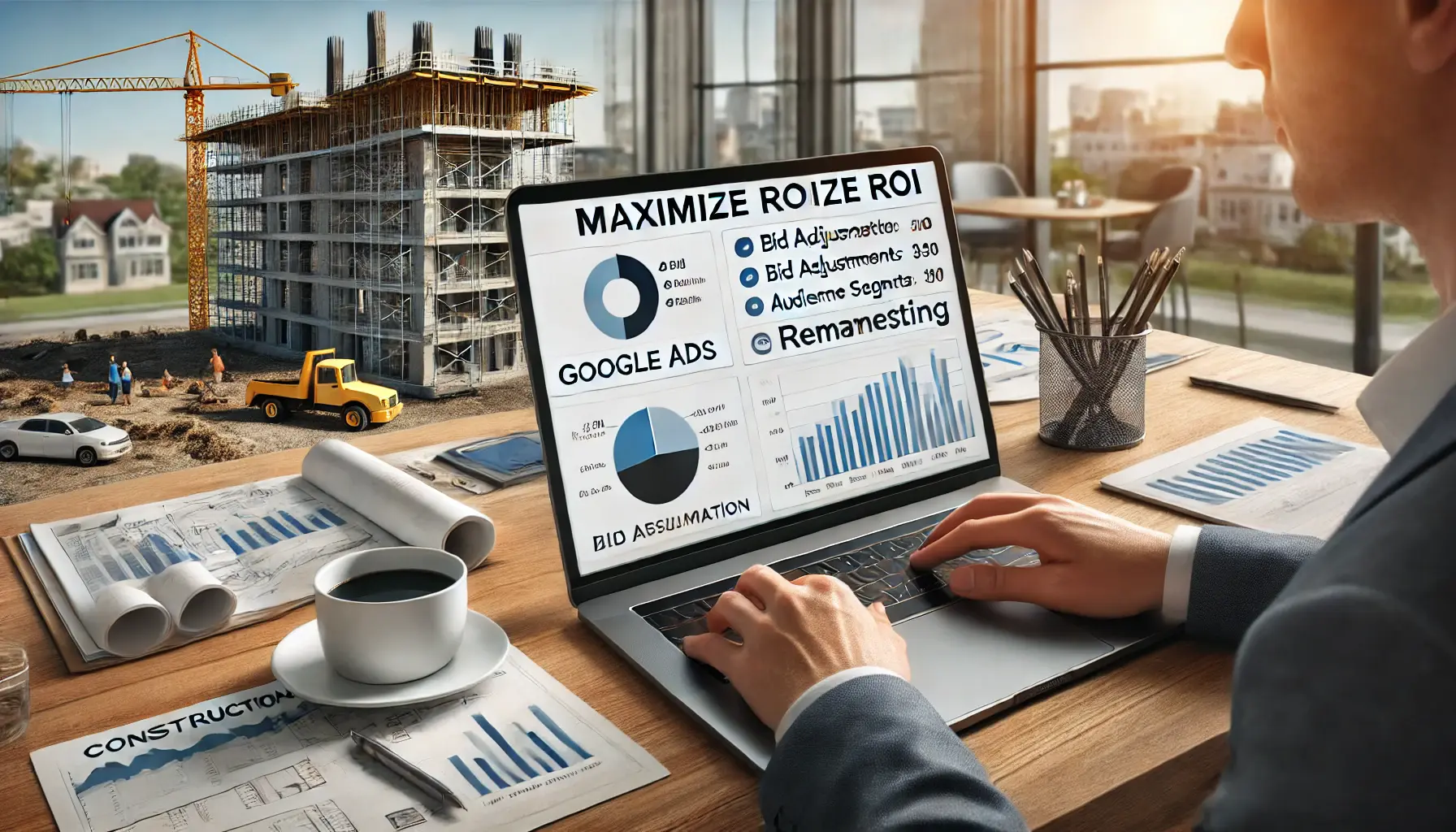In the competitive world of construction, companies often face the challenge of making themselves stand out in a sea of competitors.
Through the use of digital marketing, construction companies are now finding it imperative to implement certain tools to increase visibility and clientele.
With Google AdsA paid advertising platform by Google that allows businesses to display ads on Google's search engine and its partner sites., you gain access to a dynamic platform where construction firms can showcase their services to the right audience at the right time.
This article dives into how construction companies can effectively use Google Ads to grow their business and stay ahead in a crowded market.
- Understanding the Importance of Google Ads for Construction Companies
- Setting Up Effective Google Ads Campaigns for Construction Services
- Advanced Strategies to Maximize ROI in Construction Advertising
- Overcoming Common Challenges in Google Ads for Construction Companies
- Measuring Success: Key Metrics and Tools for Google Ads in Construction
- Building Success with Google Ads for Construction Companies
- Google Ads for Construction Companies: Frequently Asked Questions
Understanding the Importance of Google Ads for Construction Companies
Traditional ways of advertising for a construction company, such as billboards, newspaper ads, or flyers, might not cut it in a digitally driven era.
Since the majority of potential clients begin looking for services online, Google Ads provides a direct and measurable approach to reaching them.
By appearing at the top of search engine results, your company can secure prime digital real estate, ensuring that your services are seen by active prospects.
Why is this important?
Think about the last time you searched for a contractor or home renovation service.
Did you go past the first few results on Google?
Most likely not.
That’s exactly where Google Ads can give construction companies a competitive edge, helping them appear right where potential clients are searching.

Google Ads bridging digital marketing and construction for enhanced visibility.
Why Google Ads Matter in the Construction Industry
The construction industry has unique needs when it comes to marketing.
Unlike retail or tech, construction projects often involve higher costs and longer decision-making cycles.
Google Ads can help by targeting individuals who are already considering construction services, ensuring that your ad budget is spent wisely on high-intent prospects.
- Precision Targeting: With Google Ads, you can target specific demographics, locations, and even times of the day to maximize visibility.
- Measurable Results: Unlike traditional ads, Google Ads provide data-driven insights, allowing you to track impressions, clicks, and conversions.
- Cost-Effectiveness: You pay only for clicks, making it a budget-friendly option for companies of all sizes.

Traditional advertising meets digital innovation in construction marketing.
Comparing Google Ads to Traditional Advertising Methods
Traditional advertising methods still hold some value, but they often lack the precision and flexibility of digital advertising.
For instance:
- Billboards: While visible, billboards can’t target a specific audience or track the effectiveness of your ad.
- Newspaper Ads: These may be somewhat effective locally, but measuring reach and effectiveness is much harder compared to online campaigns.
- Flyers: Often ignored or discarded, flyers lack the impact and reach of a well-placed online ad.
By contrast, Google Ads enable construction companies to target specific keywords and audiences, ensuring their message reaches those actively seeking their services.
This precision can significantly boost ROI, making Google Ads a smarter investment in today’s digital-first marketplace.

Google Ads bridging the gap between digital campaigns and construction operations.
The Role of Google Ads in Modern Construction Marketing
Google Ads is not just a tool; it’s a game-changer for construction marketing.
It allows businesses to:
- Build Trust: Ads at the top of Google search results create a sense of authority and reliability for potential clients.
- Expand Reach: With millions of searches every day, Google Ads ensures your services reach a vast audience.
- Adapt Quickly: Unlike traditional campaigns, Google Ads can be adjusted in real-time using performance data to optimize continuously.
By understanding and leveraging Google Ads, general contractors can position themselves as thought leaders in their respective markets and focus on meeting customers’ ever-changing digital needs.
Google Ads ensures construction companies secure prime digital real estate, helping them stand out in a competitive market.

Strategic setup of Google Ads campaigns tailored for construction services.
Setting Up Effective Google Ads Campaigns for Construction Services
Establishing a successful Google Ads campaign is crucial for construction companies aiming to enhance their online presence and attract potential clients.
A well-structured campaign ensures that your services reach the right audience, leading to increased inquiries and projects.

Targeting the right audience with relevant keywords for construction services.
Identifying Target Audiences and Relevant Keywords
Define your target audience carefully, considering their location, demographics, and specific construction services they might need.
Understanding your audience is essential for effectively communicating with them through your ads.
Perform thorough keyword research to identify the terms your potential clients use when searching for construction services.
Tools like Google’s Keyword Planner can help you find high-volume and relevant keywords.
For example, if you specialize in roofing, keywords like “roofing contractors near me” or “roof repair services” can be effective.
Choosing the right keywords ensures your ads appear in relevant search results, increasing the likelihood of attracting interested clients.

Creating engaging ad copy and visuals for impactful construction marketing.
Crafting Compelling Ad Copy and Visuals
Your ad copy should be concise, engaging, and highlight the unique aspects of your construction services.
Clearly state the benefits clients can expect, such as quality workmanship, timely project completion, or competitive pricing.
Including a strong call-to-action (CTA) encourages users to take the next step, whether it’s contacting you or visiting your website.
Incorporating visuals, such as images of completed projects, can enhance your ads, especially in display campaigns.
Visual content captures attention and provides a tangible representation of your work, building trust with potential clients.

Leveraging geo-targeting to connect with local clients effectively.
Utilizing Geo-Targeting to Reach Local Clients
Construction services are typically localized.
Implement geo-targetingA digital marketing strategy that delivers content to users based on their geographic location. in your Google Ads campaigns to focus on specific geographic areas where you offer services.
This ensures your ads are shown to users within your operational regions, maximizing relevance and reducing wasted ad spend.
For example, if your company operates in Mersin, targeting that area ensures your ads reach potential clients in that locale.
Tracking conversions to measure and optimize advertising effectiveness.
Implementing Conversion Tracking for Measurable Results
Setting up conversion trackingA method to track user actions after interacting with an ad, such as making a purchase or submitting a form. helps you measure the effectiveness of your Google Ads campaigns.
You can track actions users take after visiting your website from your ads, such as filling out a contact form or calling your business.
This provides insights into which ads and keywords drive valuable actions, enabling you to make data-driven decisions to improve performance.
By focusing on these key areas, construction companies can craft highly effective Google Ads campaigns that are cost-effective and highly targeted to their specific audience, increasing visibility and client acquisition.
Defining target audiences and selecting relevant keywords are critical first steps in crafting effective Google Ads campaigns.

Employing advanced strategies to optimize ROI in construction advertising.
Advanced Strategies to Maximize ROI in Construction Advertising
In the competitive construction industry, leveraging advanced Google Ads strategies is essential to maximize return on investment (ROI).
By implementing sophisticated techniques, construction companies can enhance their advertising effectiveness and achieve better results.

Re-engaging prospects through targeted remarketing campaigns in construction marketing.
Leveraging Remarketing Campaigns to Re-engage Prospects
Remarketing lets you reach users who have visited your website but did not convert.
By showing targeted ads to such prospects as they visit other websites, you keep your construction services top of mind, increasing the chances of conversion upon their return.
Below are a few ways to use this powerful tool:
- Customized Messaging: Build ads targeting specific interests or pages viewed by the user to make the content more relevant and engaging.
- Frequency Capping: Control how often your ads are shown to prevent overexposure, which can lead to ad fatigue.

undefined
Optimizing Bidding Strategies for Cost-Effective Clicks
Effective bidding strategies ensure the highest value from your ad spend.
Using automated bidding options, such as Target CPACost Per Acquisition, the average cost of acquiring one customer through advertising. or Target ROASReturn on Ad Spend, a measure of revenue generated for every dollar spent on advertising., can help achieve specific financial goals by adjusting bids in real-time based on the likelihood of conversion.
- Bid Adjustments: Modify bids by device, location, and time to allocate budget where it performs best.
- Competitive Analysis: Monitor competitor bids to stay competitive without overspending.

Optimizing ad performance through A/B testing in construction marketing.
A/B Testing Ad Variations for Continuous Improvement
Regularly testing different ad elements helps identify what resonates best with your audience.
Experiment with various headlines, descriptions, and calls-to-action to determine the most effective combinations.
- Split Testing: Run multiple ad versions simultaneously to compare performance metrics.
- Data-Driven Decisions: Use insights from tests to refine future ad content and strategy.

undefined
Integrating Google Ads with Other Marketing Channels
A cohesive marketing strategy amplifies your reach and effectiveness.
Align your Google Ads campaigns with other channels like social media, email marketing, and SEO to create a unified brand message.
- Cross-Channel Promotion: Use consistent branding and messaging across all platforms to reinforce recognition.
- Holistic Analytics: Analyze data from all channels to understand the customer journey and optimize touchpoints.
By implementing these advanced strategies, construction companies can take their Google Ads campaigns to the next level, improving ROI and sustaining business growth.
Leveraging remarketingA strategy that shows ads to users who have previously interacted with a website or app., optimizing bidding strategies, and A/B testingA method of comparing two versions of an ad or webpage to determine which performs better. are advanced methods to boost ROI for construction companies.

Collaborating to overcome challenges in Google Ads for construction marketing.
Overcoming Common Challenges in Google Ads for Construction Companies
Running Google Ads campaigns presents unique challenges for construction companies.
Addressing these effectively can significantly enhance your advertising success.

undefined
Effectively Targeting Local Audiences
One primary challenge is reaching potential clients in specific geographic areas, as proximity and local reputation play significant roles in decision-making processes.
To overcome this:
- Implement Geo-Targeting: Use Google Ads’ location settings to focus your ads on specific regions where your services are available.
- Leverage Local Keywords: Incorporate location-specific keywords to align with local search queries.

Defining a digital target audience through data analysis for construction marketing.
Understanding and Defining the Digital Target Audience
Another significant issue is defining and understanding the digital target audience.
To address this:
- Conduct Market Research: Analyze demographics, online behaviors, and preferences of your potential clients.
- Create Buyer Personas: Develop detailed profiles representing your ideal clients to tailor your ads effectively.

Measuring ROI for construction marketing efforts through data analysis.
Measuring Return on Investment (ROI)
Measuring the ROI of marketing efforts can be challenging, as it may take time to see the impact on lead generation and revenue.
To tackle this:
- Implement Conversion Tracking: Use tools like Google Analytics to monitor actions taken after ad clicks, such as form submissions or calls.
- Set Clear Goals: Establish clearly defined, measurable objectives for your campaigns to measure performance accurately.

Optimizing advertising budgets for more effective construction marketing.
Optimizing Your Advertising Budgets
Construction companies usually have very tight marketing budgets, so every dollar has to be used wisely.
To effectively manage your budget:
- Use Cost-Effective Bidding Strategies: Leverage automated bidding options such as Target CPA to optimize spend based on conversion likelihood.
- Regularly Review Campaign Performance: Continuously evaluate and adjust campaigns to ensure funds flow to high-performing ads.
By proactively solving these challenges, construction companies will be able to maximize their Google Ads campaigns in a way that improves visibility and client acquisition.
Challenges such as audience targeting and budget management can be addressed with geo-targeting, detailed buyer personas, and strategic planning.

undefined
Measuring Success: Key Metrics and Tools for Google Ads in Construction
For construction companies, effectively measuring the success of Google Ads campaigns is crucial to ensure optimal return on investment (ROI).
By focusing on specific key performance indicators (KPIs) and utilizing appropriate tools, you can gain valuable insights into your campaigns’ performance and make informed decisions.

Analyzing essential KPIs for measuring success in construction marketing.
Essential Key Performance Indicators (KPIs)
Monitoring the right KPIs enables you to evaluate and further optimize your Google Ads campaigns:
- Click-Through Rate (CTR): The percentage of users who click on your ad after it has been served. A high CTR signifies the relevance and attractiveness of the ad to your target audience.
- Conversion Rate: The number of clicks on your ad that lead to desired actions, such as form submissions or calls. A higher conversion rate reflects effective ad targeting and the relevance of the landing page.
- Cost Per Acquisition (CPA): The average cost associated with acquiring one customer via your ads. This metric helps gauge the profitability of your campaigns.
- Return on Ad Spend (ROAS): The revenue generated for every dollar spent on advertising. A higher ROAS indicates a more profitable campaign.

Leveraging analytics tools for data-driven decisions in construction marketing.
How to Leverage Analytics Tools
Leverage powerful analytics tools to monitor and analyze your campaigns:
- Google Analytics: Integrates with Google Ads to provide comprehensive data on user behavior, conversions, and campaign performance, enabling data-driven decisions.
- Google Ads Conversion Tracking: Allows you to monitor specific actions users take after interacting with your ads, facilitating precise measurement of campaign effectiveness.

Conducting regular performance reviews to optimize construction marketing campaigns.
Implementing Regular Performance Reviews
Consistently reviewing your campaigns ensures they remain aligned with your business objectives:
- Weekly Analysis: Examine KPIs such as CTR, conversion rates, and CPA to identify trends and areas for improvement.
- Monthly Reporting: Compile comprehensive reports to understand overall campaign performance and strategize for future campaigns.
By closely monitoring these metrics and using the right tools, construction companies can optimize their Google Ads campaigns for better visibility, client acquisition, and ROI.
- Monitor CTR, CPA, and ROAS to gauge ad performance.
- Leverage tools like Google Analytics and Ads Conversion Tracking for actionable insights.

Building success for construction companies through Google Ads and digital marketing strategies.
Building Success with Google Ads for Construction Companies
Throughout this article, we’ve explored how construction companies can effectively utilize Google Ads to enhance their visibility, attract more clients, and optimize their advertising efforts.
From understanding the importance of targeted campaigns to implementing advanced strategies, the potential of Google Ads for the construction industry is undeniable.

Strategic planning and key takeaways for effective construction marketing campaigns.
Key Takeaways for Effective Campaigns
In running a successful Google Ads campaign, a construction company should focus on the following key aspects:
- Target Audience Understanding: Clearly define your audience and use geo-targeting and relevant keywords to effectively reach local clients.
- Compelling Ad Content: Create captivating ad copy with visuals that communicate your unique services and drive conversions.
- Advanced Strategies: Leverage remarketing campaigns, optimize bidding strategies, and integrate your efforts with other marketing channels for maximum ROI.
- Performance Measurement: Monitor key metrics such as CTR, conversion rates, CPA, and ROAS to refine your campaigns and make data-driven decisions.

Overcoming challenges to achieve long-term success in construction marketing.
Overcoming Challenges for Long-Term Success
While running Google Ads campaigns can come with challenges like budget management and audience targeting, these can be addressed with strategic planning and regular performance reviews.
By proactively solving these issues, construction companies can create more effective and efficient campaigns.

Maximizing impact with the right tools for construction marketing success.
Maximizing Impact with the Right Tools
Analytics tools such as Google Analytics and Google Ads Conversion Tracking are indispensable for measuring success and optimizing campaigns.
Regular reviews and reporting ensure that your efforts remain aligned with your business objectives, driving sustainable growth.

Exploring the future of construction marketing with advanced technologies.
The Future of Construction Marketing
With Google Ads, your construction company will have an unsurpassed opportunity to reach your target audience, increase visibility, and grow your business.
By implementing the strategies and tools mentioned in this article, your company can stay ahead of the curve in a competitive market and see great success through digital advertising.
Integrate this information into your marketing strategy and watch your construction business soar with Google Ads as its core.
Integrating Google Ads into a broader marketing strategy ensures long-term success for construction companies in a competitive market.

Addressing frequently asked questions about Google Ads for construction companies.
Your campaigns can be managed by an agency specialized in Google Ads, check out our service page.
Google Ads for Construction Companies: Frequently Asked Questions
Common questions answered to help your construction company get the most from Google Ads for improved marketing results.
With Google Ads, a construction company will enjoy instant visibility, pinpoint targeting of desired audiences, and trackable outcomes that ensure increased website traffic with high-quality leads.
By using geo-targeting and location-based keywords, construction company ads can be viewed by potential clients in the area where the company provides services.
The average CPC for construction and contractor businesses is around $3.60, though this may vary depending on the competition and specifics of targeting.
Conversion tracking allows construction companies to monitor actions taken after ad interactions, such as form submissions or calls, enabling precise measurement of campaign effectiveness.
Utilizing automated bidding options like Target CPAAn automated bidding strategy in Google Ads that sets bids to achieve a specific cost per acquisition. or Target ROASAn automated bidding strategy in Google Ads that sets bids to achieve a specific return on ad spend. helps achieve specific financial goals by adjusting bids in real-time based on conversion likelihood.
Remarketing campaigns re-engage users who have previously visited your website, keeping your services top of mind and increasing the chances of conversion upon their return.
Analytics tools like Google Analytics provide comprehensive data on user behavior, conversions, and campaign performance, enabling data-driven decisions for optimization.
Regular performance reviews, such as weekly analyses and monthly reporting, ensure campaigns remain aligned with business objectives and allow for timely adjustments.
Yes, Google Ads enables construction companies to compete effectively by targeting specific keywords and demographics, allowing them to reach potential clients searching for their services.











